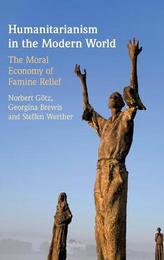
|
Humanitarianism in the Modern World: The Moral Economy of Famine Relief
Hardback
Main Details
| Title |
Humanitarianism in the Modern World: The Moral Economy of Famine Relief
|
| Authors and Contributors |
By (author) Norbert Goetz
|
|
By (author) Georgina Brewis
|
|
By (author) Steffen Werther
|
| Physical Properties |
| Format:Hardback | | Pages:320 | | Dimensions(mm): Height 235,Width 159 |
|
| Category/Genre | World history |
|---|
| ISBN/Barcode |
9781108493529
|
| Classifications | Dewey:363.8526 |
|---|
| Audience | | Professional & Vocational | |
|---|
| Illustrations |
Worked examples or Exercises; Worked examples or Exercises
|
|
Publishing Details |
| Publisher |
Cambridge University Press
|
| Imprint |
Cambridge University Press
|
| Publication Date |
23 July 2020 |
| Publication Country |
United Kingdom
|
Description
This is an innovative new history of famine relief and humanitarianism. The authors apply a moral economy approach to shed new light on the forces and ideas that motivated and shaped humanitarian aid during the Great Irish Famine, the famine of 1921-1922 in Soviet Russia and the Ukraine, and the 1980s Ethiopian famine. They place these episodes within a distinctive periodisation of humanitarianism which emphasises the correlations with politico-economic regimes: the time of elitist laissez-faire liberalism in the nineteenth century as one of ad hoc humanitarianism; that of Taylorism and mass society from c.1900-1970 as one of organised humanitarianism; and the blend of individualised post-material lifestyles and neoliberal public management since 1970 as one of expressive humanitarianism. The book as a whole shifts the focus of the history of humanitarianism from the imperatives of crisis management to the pragmatic mechanisms of fundraising, relief efforts on the ground, and finance. This book is also available as Open Access on Cambridge Core.
Author Biography
Norbert Goetz is a Professor at the Institute of Contemporary History, Soedertoern University, Sweden. He is the author of Deliberative Diplomacy (2011) and Ungleiche Geschwister (2001), for which he has been awarded with the Hans-Rosenberg-Memorial-Prize. Georgina Brewis is Associate Professor at University College London. Her previous publications include A Social History of Student Volunteering (2014), English Teachers in a Postwar Democracy (2014) and The World of UCL (2018). Steffen Werther is Associate Professor at the Institute of Contemporary History at Soedertoern University. His publications include SS-Vision und Grenzland-Realitat (2012).
Reviews'This thoughtful history of humanitarianism links three case studies, all involving original research, to an analytical-historical framework for understanding famine relief, whereby the ad hoc efforts of the nineteenth century gave way in turn to more bureaucratized relief (c. 1900-1970) and the more aggressive, media-driven humanitarianism of the present. Well-written and clever, it should attract a broad readership, including policy-makers and civil society activists.' Cormac O Grada, author of Famine: A Short History and co-editor of Famine in European History 'This book is an exciting departure in the history of humanitarianism. Its main innovation is in the authors' use of moral economy to explore in detail the triage and prioritisation famine relief work entailed. Stimulating and rewarding in turn, this book challenges our perception of how the history of aid can be written.' Bertrand Taithe, co-author of The Charity Market and Humanitarianism in Britain, 1870-1912 'Anyone interested to learn more about aid appeals for humanitarian disasters will not be disappointed by this rich account created by Goetz, Brewis and Werther. Covering three of the world's most impactful humanitarian disasters, the author's provide a wealth of information full of relevant learnings for scholars, but also philanthropy professionals working on aid appeals for current humanitarian disasters.' Pamala Wiepking, editor of The Palgrave Handbook of Global Philanthropy 'This very highly recommended book is an indispensable contribution to the growing study of historical change in humanitarian organizations.' J. M. Rich, Choice
|